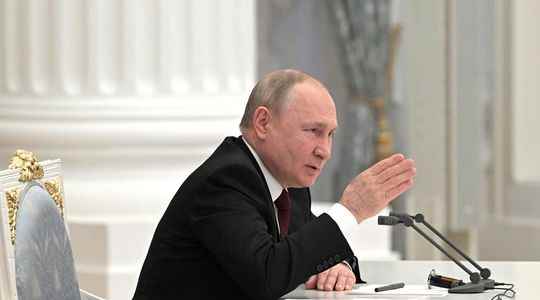Was the last dike before the outbreak of a new war in Europe broken on Monday, February 21? Despite UN alerts and attempts at mediation from France and Germany, Vladimir Putin announced, in a particularly long statement, with numerous historical justifications, his intention to recognize by decree the two independence territories. pro-Russians from Donetsk and Lugansk, in the Ukrainian Donbass.
The decision is a blow that we imagine fatal to the peace process (Minsk agreements) signed in 2014 and 2015 to end the fighting between the two parties in the area, which has so far caused the death of more than 14 000 people, and generated approximately 2 million displaced persons. Putin had previously judged that the peace process in this conflict had “no prospects”.
It is finally about the beginning of a spiral which opens the way, for Russia – military and financial godfather of the separatists – to a possible deployment of its (numerous) troops massed on the border, in this zone, in support of its new allies. It would then lead to total control of Donbass, as foreseen for several weeks now and feared by the West. The United States, through the voice of Joe Biden, said it was convinced over the weekend of an imminent attack from Russia.
Clashes and first deaths
The tension had indeed risen a notch, at the end of last week: Russia distributed passports by the hundreds of thousands in eastern Ukraine, after a multiplication of clashes and violations of the ceasefire, skilfully mounted pinned down by the separatists.
On Saturday, the Ukrainian army announced the death of two of its soldiers. While on Monday, the Russian army claimed to have killed five “saboteurs” from Ukraine on its territory and to have arrested a Ukrainian soldier. Kiev denied having sent these men. Two Ukrainian soldiers and a civilian were also killed in separatist shelling in the Donetsk region in eastern Ukraine on the same day.
According to the Kremlin, Vladimir Putin informed of this recognition of Donetsk and Lugansk his French counterpart Emmanuel Macron and German Chancellor Olaf Scholz, mediators in the conflict in eastern Ukraine, and they, according to the Kremlin, “expressed their disappointment”. Scholz had claimed that such a move would constitute a “unilateral rupture” of the Minsk agreements. Emmanuel Macron convened, on Monday evening, a Defense Council specially dedicated to the subject, after having met with Russian Presidents Vladimir Putin and Ukrainian President Volodymyr Zelensky, as well as with German Chancellor Olaf Scholz on two occasions, and European officials Charles Michel and Ursula Von der Leyen.
European sanctions expected
The European Union has said it is ready to trigger sanctions against Moscow, calling until the last minute not to recognize the independence of these regions. The decision on sanctions is to be taken by EU leaders meeting in summit and an extraordinary meeting of EU foreign ministers will be convened to adopt them. The European summit can be held by videoconference, a European source said. European sanctions must be decided unanimously and “unanimity on the Ukraine file is guaranteed”, said Monday the head of European diplomacy Josep Borrell. Which ones? “There are different measures and the degree of their implementation depends on the level of aggression,” he eluded.
“If Vladimir Putin starts a war, we will respond with the strongest lever we have: economic and financial sanctions, because the economy is Russia’s weak point,” European Commission President Ursula said the day before. von der Leyen, in an interview with the German television channel ARD. “Financial sanctions would mean that Russia would be virtually cut off from international financial markets,” she said.
An eviction of the Swift system, the stopping of the Nordstream 2 project or the freezing of the foreign assets of the oligarchs close to power, however, seem to be on the table. Nothing indicates that Vladimir Putin is sensitive to it. The latter again incriminated at the beginning of the week the Western countries, accusing them of “using Ukraine as an instrument of confrontation with our country”, which “represents a serious threat, very great for us”.
All is not over, diplomatically speaking. A meeting is scheduled for Thursday in Geneva between the head of Russian diplomacy Sergei Lavrov and his American counterpart Anthony Blinken. On the other hand, despite Emmanuel Macron’s wishes, no face-to-face will take place between Joe Biden and Vladimir Poutine for the moment.
